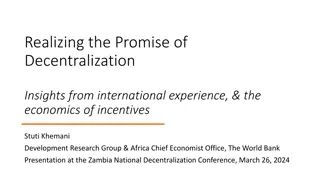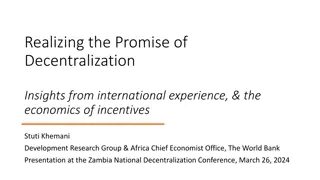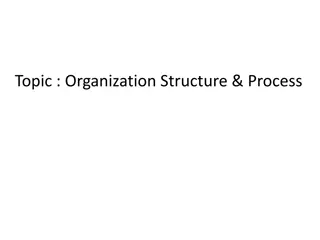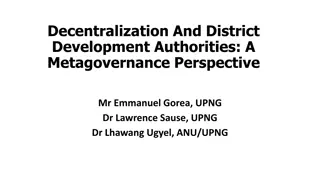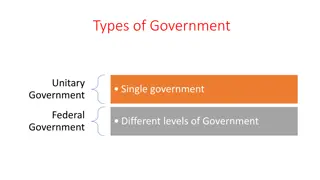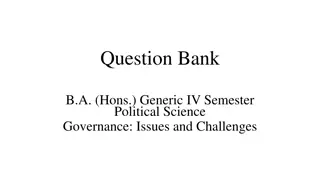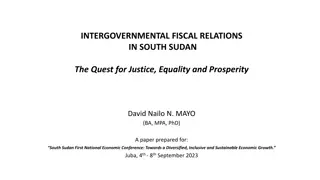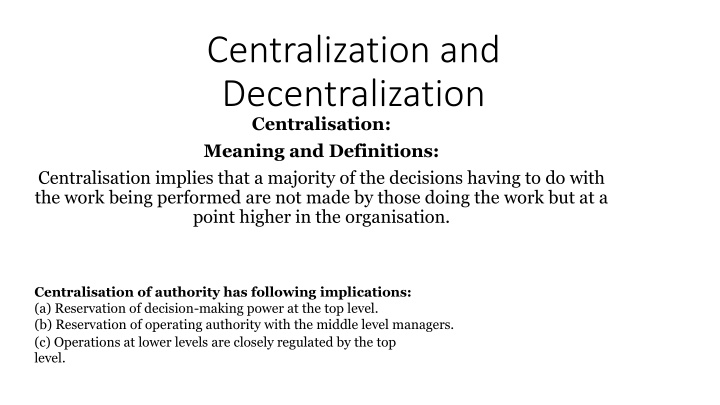
Centralization and Decentralization
Learn about the concepts of centralization and decentralization in organizational management, their implications, advantages, and differences. Discover how centralization promotes personal leadership and uniformity of action, while decentralization empowers employees and improves decision-making quality. Find out how both approaches can impact business operations and overall management effectiveness.
Download Presentation

Please find below an Image/Link to download the presentation.
The content on the website is provided AS IS for your information and personal use only. It may not be sold, licensed, or shared on other websites without obtaining consent from the author. If you encounter any issues during the download, it is possible that the publisher has removed the file from their server.
You are allowed to download the files provided on this website for personal or commercial use, subject to the condition that they are used lawfully. All files are the property of their respective owners.
The content on the website is provided AS IS for your information and personal use only. It may not be sold, licensed, or shared on other websites without obtaining consent from the author.
E N D
Presentation Transcript
Centralization and Decentralization Centralisation: Meaning and Definitions: Centralisation implies that a majority of the decisions having to do with the work being performed are not made by those doing the work but at a point higher in the organisation. Centralisation of authority has following implications: (a) Reservation of decision-making power at the top level. (b) Reservation of operating authority with the middle level managers. (c) Operations at lower levels are closely regulated by the top level.
Advantages of Centralisation: . It Promotes Personal Leadership In case of small enterprises, personal leadership is an important factor for the success. Similarly, businesses in early stages have operations relatively on a small scale therefore top manager can concentrate entire authority with himself. This will help in taking quick and correct decisions. Helps in Achieving Uniformity of Action Where a company wishes all operative units to perform certain functions in the same manner and at the same time, there must be centralisation of appropriate decision-making. This will help in achieving uniformity of actions. essential for the success of the business.
Centralisation has been effective in saving costs and unnecessary overheads since any overlapping or duplicate activities are eliminated The control on operations is outstanding in centralised entities because the mechanism of decision-making is in a single core. Lastly, centralised entities can recognise outstanding talent and enable preferred promotions or other sops to deserving employees.
Meaning of Decentralization Decentralisation is its polar opposite. Decision-making and other endeavours are delegated by the top management to subordinates, who in turn are the mid-tier management authorities. Delegation is the key to decentralisation. Once lower and mid-level management takes decisions which may impact an entire entity, employee empowerment enters the act. The mid-level employees and management have more at stake, and their attention and responsibilities increase automatically.
Advantages of Decentralisation When it comes to centralisation vs decentralisation, the latter approach boasts these advantages in its favour.Both mid and low-level management are involved in a decision-making process of a decentralised company. It boosts morale, helps employees and managers take independent calls on slippery real-world business situations and also helps delegation of duties.Very importantly, decentralisation improves the quality of management in any company. If there is rapid employee attrition in company A , for example, the blame often lies with the immediate management. Weeding out any problems is thus easier.There is enough data from research to suggest that decentralised companies take better decisions in crucial situations. The same idea is also true for an entire economy.



